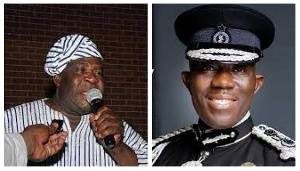In a recent outburst that sent shockwaves through the political landscape, Bugri Naabu, a prominent figure in Ghanaian politics, made headlines with his fiery rhetoric against the Inspector General of Police (IGP). Naabu's provocative statement, "Who is IGP for me to be his boy?
Don't get me angry" has raised eyebrows and drawn mixed reactions from the public, prompting a deeper examination of power dynamics, political influence, and the role of law enforcement in a democratic society.
Bugri Naabu's reputation precedes him. Known for his outspoken nature and occasional controversial remarks, he is no stranger to the limelight.
As a former Northern Regional Chairman of the ruling party, his words carry weight within the party's ranks and resonate with his supporters.
However, his latest tirade against the IGP has garnered widespread attention and concern, as it touches upon sensitive issues of authority and respect for law enforcement institutions.
The office of the Inspector General of Police holds significant responsibility for maintaining law and order, upholding justice, and protecting citizens' rights. In a democratic society like Ghana, the police force plays a crucial role in ensuring the safety and security of the people. As such, it is essential for public officials, irrespective of their stature or political affiliations, to respect and cooperate with the police and other law enforcement agencies.
The language used by Bugri Naabu in his statement has raised questions about the perception of some political figures regarding the hierarchy and duties of public servants. The notion of being someone's "boy" implies subservience and obedience, which is an inappropriate and troubling characterization of the relationship between public officials and law enforcement.
The IGP, as the highest-ranking officer in the Ghana Police Service, holds a position of authority that demands respect from all citizens, including politicians. It is essential to recognise that law enforcement agencies are independent entities designed to serve and protect the interests of the general public, not to be subject to the whims of individual politicians.
Bugri Naabu's statement also highlights the importance of ensuring that the police force remains politically neutral and free from undue influence.
The autonomy of law enforcement agencies is vital to maintaining public trust and upholding the rule of law. Any perception of political interference can undermine public confidence in the impartiality and fairness of the justice system.
In response to Bugri Naabu's remarks, many have called for more measured and respectful discourse from public figures. Constructive engagement with law enforcement agencies is necessary for effective governance and the betterment of society as a whole. Public officials must lead by example, fostering an environment of mutual respect and cooperation between political leaders and law enforcement institutions.
Furthermore, the incident highlights the need for ongoing efforts to promote transparency and accountability within the political sphere.
Political leaders must be held accountable for their actions and statements, especially those that may undermine public institutions or incite discord within society. Public discourse should be guided by reason, respect, and a commitment to the common good.
In light of this incident, it is also essential to reflect on the broader issue of political communication and its impact on public perception. Political rhetoric can shape public opinion and influence citizens' attitudes towards institutions, including the police. Leaders must be mindful of the potential consequences of their words and actions, as they can either foster unity or deepen divisions within society.
The media also plays a vital role in shaping the narrative around such incidents. Objective and responsible reporting is crucial to providing the public with accurate information and context. Sensationalising or misrepresenting statements can exacerbate tensions and contribute to a climate of hostility between political figures and law enforcement.
Ultimately, the incident involving Bugri Naabu serves as a reminder of the importance of a robust and independent judiciary in safeguarding democratic principles. The judiciary acts as a check on the abuse of power and ensures that all individuals, regardless of their status, are subject to the rule of law. Fair and impartial adjudication is fundamental to upholding justice and maintaining public trust in the legal system.
In conclusion, Bugri Naabu's recent outburst against the Inspector General of Police has sparked important conversations about power dynamics, political influence, and the relationship between politicians and law enforcement. It is essential for public officials to recognise the importance of respecting the autonomy and authority of law enforcement agencies to ensure the effective functioning of a democratic society.
Constructive and respectful engagement between political figures and law enforcement is crucial for the betterment of society and the protection of citizens' rights. Leaders must exercise restraint in their language and actions, considering the potential consequences of their words on public perception and the overall health of the nation's democracy.
As Ghana continues its journey towards progress and prosperity, fostering a culture of transparency, accountability, and mutual respect between all institutions, including the police and political leadership, will be paramount. This approach will strengthen the nation's democratic foundations and reaffirm the collective commitment to upholding justice, fairness, and the rule of law for all citizens.




No comments yet
Be the first to share your thoughts!